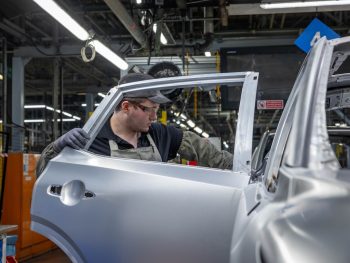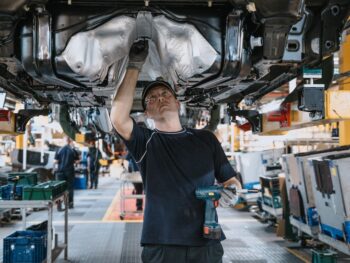Trump’s tariffs to have far-reaching consequences, auto sector warns
The automotive sector has warned that Trump’s newly announced ‘Liberation Day’ import tariffs are likely to have far-reaching consequences, putting automotive jobs at risk, reshaping the automotive sector, while also hitting US consumers hard.

The SMMT said tariffs were yet another challenge to a sector already facing multiple headwinds
President Trump yesterday confirmed a 25% tariff on all cars imported into the US, including from the UK, alongside the imposition of a 10% tariff on all UK products exported to the US and 20% on those from the EU.
Prime Minister Sir Keir Starmer said that “clearly, there will be an economic impact” but the Government would respond with “cool and calm heads”.
But with one in eight UK-built cars exported to the USA – the second largest market outside the EU – British vehicle manufacturers face an extreme challenge.
The Society of Motor Manufacturers and Traders (SMMT) said the tariffs were a “deeply disappointing and potentially damaging measure”.
Mike Hawes, chief executive of the automotive trade body, said: “While we hope a deal between the UK and US can still be negotiated, this is yet another challenge to a sector already facing multiple headwinds.
“These tariff costs cannot be absorbed by manufacturers, thus hitting US consumers who may face additional costs and a reduced choice of iconic British brands, whilst UK producers may have to review output in the face of constrained demand. Trade discussions must continue at pace, therefore, and we urge all parties to continue to negotiate and deliver solutions which support jobs, consumer demand and economic growth across both sides of the Atlantic.”
The Institute for Public Policy Research (IPPR) has said that over 25,000 direct jobs in the car manufacturing industry could be at risk, with UK employees at Jaguar Land Rover and the Cowley Mini factory seen as some of the most exposed.
And the National Franchised Dealers Association warned that the cumulative effects of these tariffs would be profound, impacting dealers “who have already shown remarkable resilience in the face of economic challenges, as well as manufacturers and the broader automotive industry”.
Tariffs to have far-reaching consequences across the UK and EU
The fallout from the tariff announcement is also reverberating globally.

The Government has been urged ensure that the UK remains a competitive and attractive market for auto innovation and growth
Germany’s Association of International Motor Vehicle Manufacturers (VDIK) said it was a “devastating day for free global trade” and added that the USA tariffs were “poison not only for the globally orientated automotive industry, but for global trade as a whole”.
VDIK president Imelda Labbé went on: “The tariffs will make imports into the USA more expensive, turn supply and trade chains upside down and weaken consumption. American consumers in particular will initially have to pay for this with a rise in inflation and a weakening of the dollar.”
According to reports, carmakers including Volkswagen are already planning price hikes.
While Carwow said some manufacturers may absorb tariff costs in the short term to maintain competitive pricing until existing stock clears, it added that premium brands in high demand are more likely to pass them on to consumers – such as Ferrari, which recently announced a 10% US price increase.
Other firms may try to bypass them; many European manufacturers are accelerating their plans to expand US production, with Volvo, Audi, Mercedes-Benz and Hyundai already moving in this direction.
Philipp Sayler von Amende, chief commercial officer at Carwow, also said the tariffs could drive a renewed focus on European production, marketing and sales efforts – increasing competition and potentially lowering prices in the region. He’s called on the Government to ensure that the UK remains a competitive and attractive market for automotive innovation and growth.
The Carwow CCO added: “What’s clear is that these tariffs will have far-reaching consequences, from factory workers to retailers and car buyers across the EU.”
PwC UK said tariffs of any kind would have considerable repercussions for the UK automotive sector and added that OEMs are having to consider their pricing strategies and responses.
Cara Haffey, industrials and services leader at PwC UK, said: “UK automotive companies are now reconsidering their manufacturing site maps and exploring how they can expand existing US operations and assessing creating long-term US-based operations, if the market is or could be very important to their brand. This is very much long-term thinking, as such sizeable decisions take time to both plan and deliver.”
UK automotive companies can adopt several different strategies to counter the effects of US tariffs, such as the localisation of assembly or manufacturing operations in North America to avoid tariffs, while maintaining market access, although this takes time and requires significant capital, according to Dom Tribe, automotive sector leader at PwC UK.
Other measures on the table include diversifying or repositioning supply chains to areas/regions less affected by any imposed tariffs; greater product differentiation that bring added value which consumers are willing to pay a premium for; and strategic alliances, such as partnering with US firms.
He also said a push for subscription-based vehicle ownership models could help dilute the vehicle cost within a total cost of ownership model, reducing the exposure to tariffs that impact the asset cost, but not the service costs.
The imposition of tariffs is also expected to prove highly unpopular with UK drivers with new research showing that the public takes a dim view of such economic protectionism.
Research by Startline Motor Finance found almost six out of 10 (59%) drivers say they are less likely to buy a car from a country imposing tariffs on UK-made models.
The study also revealed that 32% say this kind of boycott is a good way to fight back against tariffs although 15% doubt that choosing to boycott has any impact.
UK urged to ‘double down’ on support for homegrown EVs
The Institute for Public Policy Research (IPPR) has urged the UK government to act on the new tariffs by bolstering support for domestic-made electric cars.

The IPPR says the Government should offer incentives on domestic-made electric cars to consumers
A new report from the think-tank argues that if the Government encourages consumers – both in the UK and internationally – to “buy British and buy green”, the UK could boost economic growth, create jobs and advance key climate goals.
According to the report, the global export value of internal combustion engine cars fell by 24% between 2018 and 2022, while the sale of electric cars soared by 740%.
The authors say the UK has pre-existing strengths to take full advantage of this trend.
Over a third (35%) of cars manufactured in the UK in 2024 were electric or hybrid models, many of which were exported.
According to the think-tank, the UK currently has 4,938 firms in the UK that manufacture transport products and their components, with 263,000 employees and an annual turnover of £102.1bn. Many of these already manufacture green transport products, or have the capacity to.
In addition to making up for decreased car exports to the US elsewhere by focusing on capturing the growing international demand for green vehicles, it also reckons there is a huge untapped internal market. Car manufacturing in the UK is now 2.5 times lower than car registration – meaning there is currently a significant reliance on importing cars from abroad.
Key recommendations from the IPPR for the Government’s upcoming industrial strategy include expanding UK demand for green transport products, by offering incentives on domestic-made electric cars to consumers, cutting VAT on public charging points and providing grants to lower-income buyers.
It’s also urged the UK to capitalise on trade opportunities for green transport products, by reducing customs and regulatory frictions with the EU and introducing well-targeted tariff reductions for crucial inputs, such as battery components, to keep manufacturers’ costs as low as possible
Pranesh Narayanan, research fellow at IPPR, said: “If the Government use the upcoming industrial strategy to drive investment in these sectors, this could be the spark that leads to thousands of new consumers to start buying British and buying green.”
UK could transform into offshore manufacturing hub for the EU
If the UK can negotiate a US trade deal, it could transform itself to an offshore manufacturing hub for the EU, according to accountancy firm Lubbock Fine.
The UK government is expected to continue negotiating a trade deal with the US with the implicit aim of achieving a better deal than the EU.
If that is achieved, then the UK could become an increasingly popular location for EU manufacturers such as the German automotive industry and its supply chain. Goods, such as cars, which are assembled or manufactured in the UK, would in theory be subject to a UK–US trade deal.
Alex Altman, partner and head of German desk at Lubbock Fine, said: “Helping to build the UK as a key manufacturing hub for German car makers would give a significant boost to the UK economy.
“Achieving this would make more than justify ditching the Digital Services Tax, which is one of the compromises the UK government is said to considering offering to the US.
“The UK has a lot of spare automotive manufacturing capacity after Brexit, which makes leveraging the UK’s special relationship with the US well worth it.”
















Leave a comment